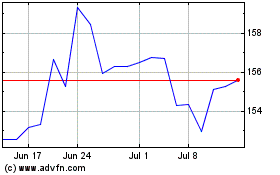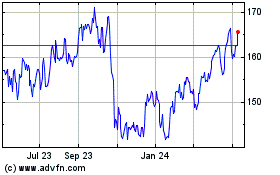Calpers Pushes Exxon to Outline Potential Effects of Climate-Change Initiatives
April 12 2016 - 12:20PM
Dow Jones News
Investors holding more than $5 billion in Exxon Mobil Corp.
shares are urging the company to disclose how its business would be
affected by the global push to slow warming atmospheric
temperatures.
The California Public Employees' Retirement System is planning
an effort to put its muscle behind climate-related shareholder
proposals for the first time. The outreach campaign is expected to
test the strength of climate activism among shareholders of the
world's largest publicly traded oil company, whose stock-market
value was $345.55 billion as of Monday, according to FactSet.
Environmentally minded Exxon investors have sought for decades
to use the company's annual meeting, set for next month, as a bully
pulpit, usually with limited success. This year, a change in
investor attitude following the December climate talks in Paris and
an active proxy campaign could garner far more votes than in
previous contests, analysts say.
Similar proposals passed overwhelmingly last year after
executives at Royal Dutch Shell PLC and BP PLC decided to embrace
them, but climate-related resolutions have never exceeded 35% in
votes at the annual meetings of Exxon or Chevron Corp.
"This isn't an environmental issue. This has moved into the
mainstream following the Paris agreement," said Anne Simpson,
Calpers' investment director of global governance.
Nearly 200 countries pledged in Paris in December to hold the
rise in average global temperatures to less than two degrees
Celsius above pre-industrial levels.
Calpers is launching a campaign to encourage shareholders to
support proposals urging Exxon, Chevron and 10 other energy and
mining companies to examine how much of their reserves would have
to be left untapped if the two-degree goal were to be achieved, Ms.
Simpson said.
Exxon and Chevron executives have had a consistent message for
years on the future of oil and gas drilling, saying that economic
growth in emerging economies such as India and China will power
fossil-fuel demand for many decades. The companies as well as
forecasters including the International Energy Agency don't yet
consider the low-carbon scenario contemplated in the Paris
agreement to be a base case, or most likely, outcome.
Last week, Chevron recommended a vote against the proposal. The
company said it already accounts for climate risks in its project
planning, and that such a disclosure would put it at a competitive
disadvantage.
Both Exxon and Chevron sought to keep the two-degree proposals
from reaching their proxy ballot, telling the U.S. Securities and
Exchange Commission they are vague and unnecessary given their
other disclosures about climate risks. Last month, the SEC ruled
the proposals could go forward. The resolutions are nonbinding.
More than 30 investors, including New York City's pension funds
and Legal & General Investment Management, have committed to
supporting the Exxon resolution, according to Ceres, a non profit
that advocates for sustainable business.
The campaign is part of a nascent movement advocating for
greater understanding of climate risks. The central idea is that to
achieve the two-degrees Celsius goal, a significant amount of oil,
gas and coal held by world producers would have to remain in the
ground.
Barclays PLC estimates that in a two-degree scenario, energy
producers would earn $103 trillion in revenue between 2014 and
2040, $34 trillion lower than in a base-case scenario for energy
consumption.
Some experts say these concerns are overblown. Companies are
valued on their expected production in the next 10 to 15 years, not
on their entire portfolio of reserves, said Nancy Meyer, associate
director for climate strategy at consulting firm IHS.
"The whole premise that companies are financially risky today
because their nonproved assets may be unburned…doesn't necessarily
align with how those assets are valued in the marketplace," Ms.
Meyer said.
Today's low energy prices are a bigger risk to producers than
potential future regulations, she said.
Bank of England Governor Mark Carney made speeches in 2014 and
2015 warning that climate change poses risks to investors and
insurers. The G-20 group of industrial nations asked the Financial
Stability Board in Basel, Switzerland, to examine the issue.
One problem is that there is little consensus on how investors
should quantify carbon risks. Around 400 sets of guidelines exist
for disclosures related to climate or sustainability, according to
a report released March 31 by a Financial Stability Board task
force chaired by Former New York City Mayor Michael Bloomberg.
"The first step is just about getting enough information" from
companies, "so that we can make decisions that are grounded in
economics," said Jessica Ground, global head of stewardship at
Schroders, which manages $462 billion in assets and is supporting
the climate disclosure resolutions.
Write to Nicole Friedman at nicole.friedman@wsj.com and Bradley
Olson at Bradley.Olson@wsj.com
(END) Dow Jones Newswires
April 12, 2016 12:05 ET (16:05 GMT)
Copyright (c) 2016 Dow Jones & Company, Inc.
Chevron (NYSE:CVX)
Historical Stock Chart
From Mar 2024 to Apr 2024

Chevron (NYSE:CVX)
Historical Stock Chart
From Apr 2023 to Apr 2024
